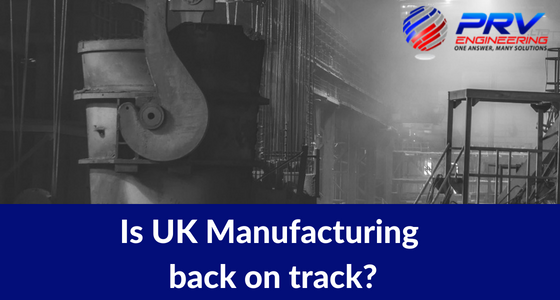The latest monthly CBI Industrial Trends Survey reports that UK Manufacturing output looks promising. They suggest that output has increased strongly and faster since the end of 2017. According to CBI, growth was broad-based, with output increasing in 14 out of 17 sub-sectors. Among the top performers are food, drink and tobacco and mechanical engineering.
Total order books show similar, healthy levels resembling that of December 2017. Exports remained stable, well above average and in line with the past 16 months. Output price expectations for inflation softened to the weakest in almost a year while stock levels moved below average. It hasn’t been smooth sailing as the UK Manufacturing sector faced some serious challenges.
While the CBI believes manufacturers will continue to benefit from robust external demand and the lower exchange rate, overall economic growth is expected to remain subdued. This comes as a result of weak consumer income growth and the continuous uncertainty stemming investments.
The UK Manufacturing Conundrum
In April the ONS said that output fell by 1.4% due to a decrease in demand for British goods. At this time, Britain’s factories recorded the biggest fall in output for more than five years. Less demand for steel and electrical machinery raised fresh concerns over the strength of the economy. In fact, during this time economists actually forecasted a modest growth of 0.3%.
The facts are in the figures and ministers should be concerned for the UK steel industry. They face pressure from US import tariffs that could ignite a similar crisis of two years ago when Tata Steel made the decision to sell its UK business. This was mainly as a result of Chinese imports threating to bankrupt the UK manufacturing sector.
According to Jude Brimble, the national secretary of the GMB union,
“Between Trump wanting to slap tariffs on our steel and the UK government refusing to be in a European customs union, UK manufacturing risks being stranded.”
Union leaders criticised the government for its stance on Brexit and not doing enough to support local businesses especially in light of an increase in trade tensions with the US. Both labour and business groups have accused ministers of mishandling the industrial strategy with little to no progress since its inception.
In hindsight, UK companies could have done more to benefit from the stronger pound that followed the EU referendum in 2016. Instead of using the strong currency to increase global sales, many companies chose to boost their profit margins. That could explain why Britain’s trade figures are less impressive than it might have been and why growth in productivity has been poor.
UK Manufacturing, Brexit And Interest Rates
UK Manufacturing makes up 10% of the economy output and construction a further 6%. Even though the construction sector has improved since April and a slightly better overall output, it may be too early to rule out an increase in interest rates from the Bank of England at the August meeting. A lot will depend on services which account for 80% of the GDP (gross domestic product).
Anna Leach, CBI head of economic intelligence, said that the increase in order recovery and bumper growth in production suggests the lull in UK manufacturing may be over. In light of persisting demands from Brexit and escalating global trade tensions, companies need to work with the Government to nurture a pro-enterprise environment that helps the UK growth shift up a gear. She added that there are things that the UK can act on to lift productivity, from building a third runway at Heathrow to investing in skill building.
Looking back at the end of 2016, we reported on how Brexit could impact UK Manufacturing. The article included some interesting reports and predictions. You can read it here.
Key Findings Of The CBI Survey
- 33% of manufacturers reported total order books are above normal while 20% said they were below normal which results in a balance of +13%
- 20% of firms said their export order books were above normal. 11% said they were below normal resulting in a balance of +9%
- 43% of businesses said the volume of output has increased over the past three months while 13% said it was down giving a balance of +29%
- Manufacturers expect output growth to decrease slightly in the next quarter, with 30% predicting an increase while 12% expect a decline showing a balance of +18%
- 16% of companies expect average selling prices to increase over the next three months with 3% predicting a decrease leaving a balance of +13%
- 16% of firms said their present stocks of finished goods are more than adequate and 8% said they were less than adequate resulting in a balance of +8%.
While there has been some growth since the beginning of 2018, there is still some uncertainty from Brexit and anti-global trade. Tom Crotty, group director of Ineos and chair of CBI Manufacturing Council said the following:
“It is becoming increasingly important for the Government to provide more clarity to UK businesses so that they can better compete at home and globally.”
PRV Engineering specialise in a number of industries including construction, automotive, aerospace, rail and steel fabrication. We firmly believe in continuous improvement, investment and innovation with an eye on Manufacturing 5-0 for sure. If you need any assistance with your engineering project, please get in touch. if you need assistance with your engineering project. Share your comments in the section below or find us on social media and use the hashtag, #PRVTech.


Recent Comments